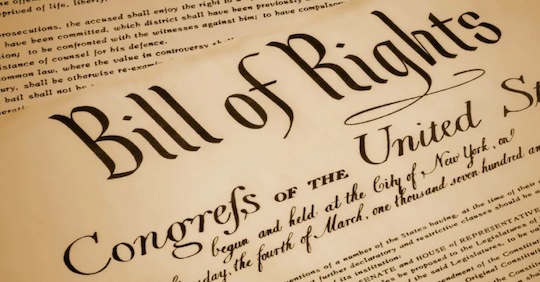On Dec 15, 1791, three-fourths of state legislatures ratified the first 10 amendments to the United States Constitution — the Bill of Rights. And today is the anniversary of that ratification and is known as Bill of Rights Day.
 I sometimes wonder how many U.S. citizens know that, or even care about it. And when they do consider the Bill of Rights, most people tend to speak as if that’s what gives us our liberties. Those amendments do no such thing. They are not permission slips from the government. What they do is act as guarantors of natural or, for those who believe, God-given rights.
I sometimes wonder how many U.S. citizens know that, or even care about it. And when they do consider the Bill of Rights, most people tend to speak as if that’s what gives us our liberties. Those amendments do no such thing. They are not permission slips from the government. What they do is act as guarantors of natural or, for those who believe, God-given rights.
Those first 10 amendments do specify some rights but, if you actually read the amendments, they refer to those rights as being antecedent, or in existence even without governmental action. Consider the phrasing of the 1st Amendment: “Congress shall make no law respecting an establishment of religion, or prohibiting the free exercise thereof; or abridging the freedom of speech, or of the press; or the right of the people peaceably to assemble…”
Notice it does not say that Congress or the Constitution grants those rights. Rather, the Constitution says Congress can’t interfere with those rights. The same holds true for the 2nd Amendment. And it should also be noted that the Constitution doesn’t refer to the rights of citizens, it talks about the rights of the people.
Furthermore, rights are not limited to those specifically mentioned. As the 9th Amendment says: “The enumeration in the Constitution, of certain rights, shall not be construed to deny or disparage others retained by the people.”
And again note, it says rights are retained “by the people.”
One question that needs to be addressed is why the need for those 10 Amendments, which might more properly be called the Bill of Guarantees.
Even though the founders failed to apply the concept of liberty to all people, as they should have, and maybe even because they knew they were wrong in not applying the concept to all, they knew the nature of government was to grow its own power — power over the people. After all, they had seen what Britain had done to the colonies, how the Crown and Parliament disregarded the rights of the colonists. And people, at least those on the state level, knew that an unrestricted national government would pose a danger.
Those amendments were designed to prevent the abuse of power, as stated in the preamble to the Bill of Rights: “The Conventions of a number of the States, having at the time of their adopting the Constitution, expressed a desire, in order to prevent misconstruction or abuse of its powers, that further declaratory and restrictive clauses should be added…”
Too bad it didn’t always work as designed. From the earliest days of the republic, there was power lust and a desire for government to be construed as superior.
Consider John Adams, one of the loudest voices for independence leading up to our secession from Great Britain. As president, he signed into law the Alien and Sedition Acts which, among other things, made it illegal to insult the president.
While the “alien” part of the law was in response to a possible war with France, the “sedition” part made it illegal to write, publish or even speak anything that could be considered an insult to President Adams, aka “His Rotundity.” It was an attack on free speech and on a free press.
The Alien and Sedition Acts were signed into law in 1797, just six years after the Bill of Rights became the first 10 amendments to the Constitution. Even now, 231 years after, they are still under attack.
Politicians and mainstream media types are playing word games with the concept of rights, using today’s dictionary to give false meaning to what the founders were saying. But what might be the saddest part, is that no one seems to be reminding politicians that they must never violate those guarantees, and too few people care.
People may argue about which of the amendments is the most important, or which few. But the fact is they’re all important. They’re important on their own and in concert with the others. And they are all important or should be, to everyone. They are our guarantees. But, as some say, “Use ‘em or lose ‘em.” And never vote them away.
About Rich Schwartzman
Rich Schwartzman has been reporting on events in the greater Chadds Ford area since September 2001 when he became the founding editor of The Chadds Ford Post. In April 2009 he became managing editor of ChaddsFordLive. He is also an award-winning photographer.


Comments